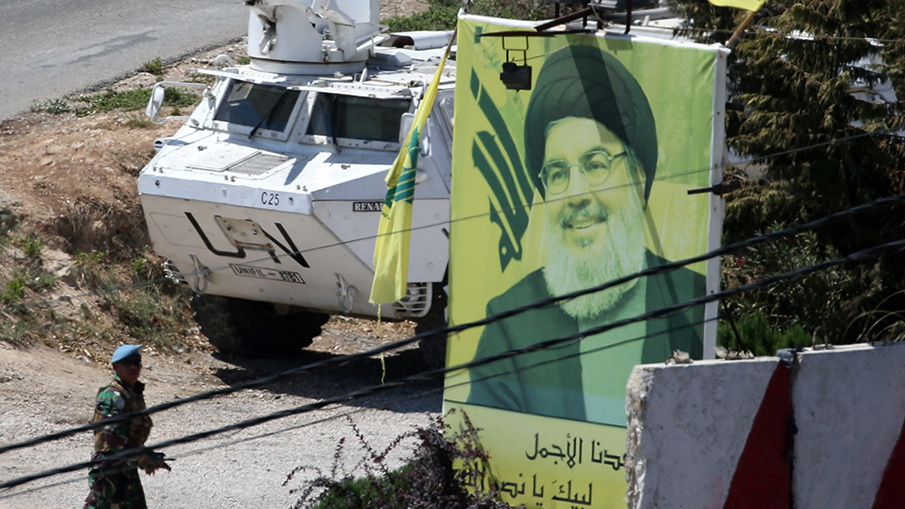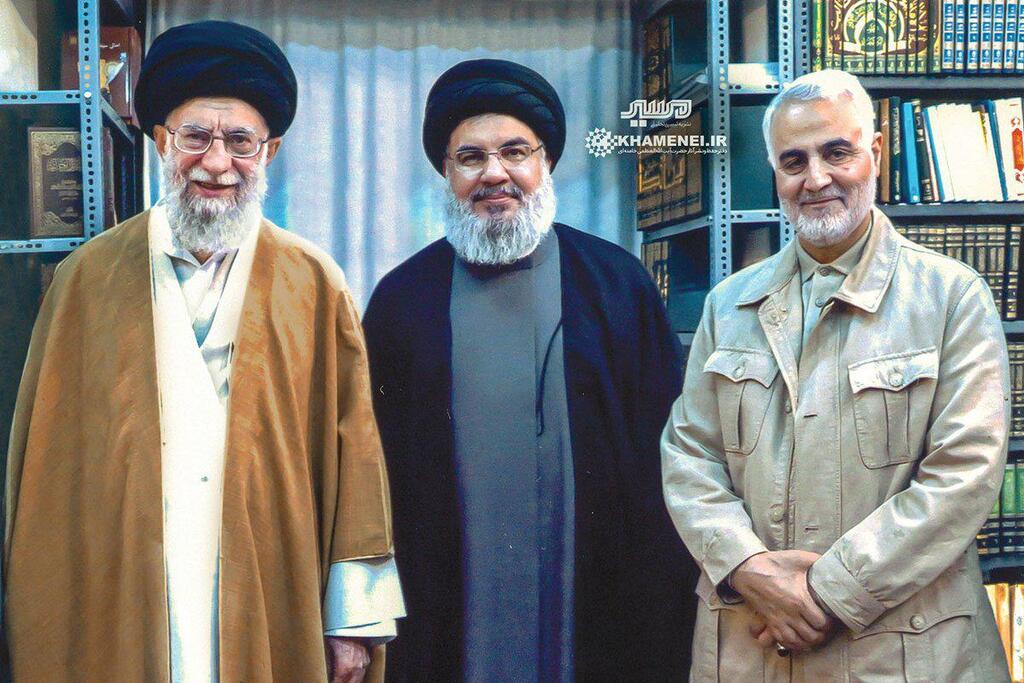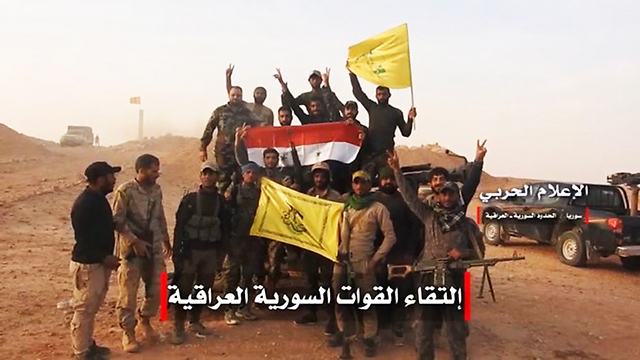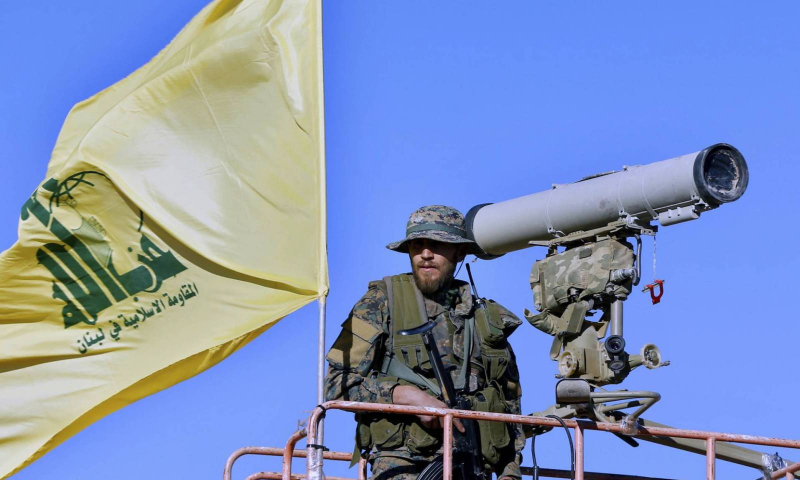Hassan Nasrallah, leader of the Lebanese Hezbollah organization, gave a wide-ranging, four-hour interview Sunday, touching on a variety of topics, including the changing White House administrations, the economic turmoil ravaging his homeland, and the continuing conflict with Israel.
Speaking with the friendly Al-Mayadeen network a week before the one-year anniversary of Iranian general Qasem Soleimani’s assassination by an American drone, Hezbollah’s secretary-general berated outgoing U.S. President Donald Trump as “crazy” and “megalomanic” and warned that, due to his mercurial nature, a U.S. military strike in the region in the remaining days before Trump’s departure could not be ruled out.
4 View gallery


A UNIFIL patrol walking past a poster of Hezbollah leader Hassan Nassrallah in southern Lebanon
(Photo: Reuters)
Nasrallah accused Washington of “awarding Israel things it didn’t even dream of,” referring to the U.S. recognition of Israeli settlements in the West Bank as not illegal “per se,” as well as the free reins the Israeli air force has enjoyed in recent years in Syria and southern Lebanon.
“The assassinations of [Hezbollah’s top general Imad] Mughniyeh and Soleimani were the result of US-Israeli cooperation,” the Beirut-based leader said.
Asked about incoming President-elect Joe Biden, Nasrallah claimed only that Jerusalem was “worried” about the changing regimes in Washington, and reassured his followers that while talks between ally Iran and the U.S. may soon resume, Tehran would not negotiate on behalf of Hezbollah.
“Nasrallah, just like the Houthis who sounded similar threat toward Israel earlier this month, are both just tools in the Iranian system,” Col. (res.) Anan Wahabi of Haifa University, a former chief instructor at Israel’s National Defense College, told The Media Line.
“Iran is worried, especially in these days of changing [U.S.] administrations, which are the most dangerous times when things can spiral out of control.”
4 View gallery


Hassan Nasrallah (c) meeting with Iranian Supreme Leader Ali Khamenei (R) and slained Iranian general Qassem Soleimani
In recent days, President Trump has openly threatened Iran with the use of force, while reports have surfaced of Israeli submarines and U.S. forces making their way toward the Persian Gulf. Last month, the Washington Post cited Pentagon officials who said the President had actively inquired about possible attack plans in Iran following his loss in the elections.
“Tehran is fearful of Trump, so it’s operating its proxies, even though it’s highly uncomfortable right now for Hezbollah to get caught up in an escalation that may lead to a miscalculation and actual battle,” Wahabi explains, noting the domestic challenges plaguing the group.
For the past few years, Israeli fighter jets have conducted repeated airstrikes in Syria, targeting Iranian operatives and bases that it deems a growing threat to its security. In one such July attack, a Hezbollah soldier was killed, sparking renewed tension between the organization and Jerusalem.
Nasrallah has promised to avenge the man’s death, and on Sunday insisted retaliation was coming.
“Our vow still stands, and Israel knows this,” he asserted. “We have capabilities that the enemy isn’t aware of, that are known to only a select few. We’re saving them … so that our enemies will be surprised.”
4 View gallery


Iranian-backed militias in Syria waving the Hezbollah and Syrian flags
(Photo: Archive)
Referring to his organization’s ongoing effort to stockpile advanced guided missiles, the most powerful man in Lebanon said: “Israel knows that that hasn’t stopped, and it won’t. It’s actually advanced – both qualitatively and quantitatively. … Hezbollah has double the amount of accurate missiles that it did a year ago.”
But Col. (ret.) Jacques Neriah, a Lebanon-born expert on Lebanese politics from the Jerusalem Center for Public Affairs, is highly skeptical of such claims. “We’re in December already, if they had had the ability or will to hurt Israel without fearing a devastating backlash, it would’ve happened by now,” he told The Media Line.
“Nasrallah won’t act now because he doesn’t want to give Israel an excuse, he’s waiting for the White House to change hands. He also apparently doesn’t have the capabilities for such a move.”
“Finally, there are also the domestic issues,” Neriah, who in the past served as Prime Minister Benjamin Netanyahu’s foreign policy advisor, continued. “Lebanon is falling apart. Hezbollah must take care of its constituents, in terms of funding, medicine. The U.S. sanctions are eating its reserves. It can’t deal with Israel right now.”
“There’s no chance of that happening,” Neriya stated. “On the contrary. Despite the criticism, Hezbollah has only become stronger. It’s taken over the black market, it uses Iranian drugs and medicine, desperately needed in Lebanon, to stockpile U.S. dollars and fund its operation.”
“As time goes on, Nasrallah is more in control of government. It’s no coincidence the government everyone thought was imminent a few weeks ago collapsed. Hezbollah put the brakes.”
Wahabi agreed. “The idea that a government can be formed without Hezbollah is far-fetched. It’s impossible,” he said.
“It will be part of any future government and it will continue to have influence, but it will be reined in. Hezbollah will have to be more pragmatic, to lower its profile, to give some concessions, especially on economic reform which is so badly needed.”


